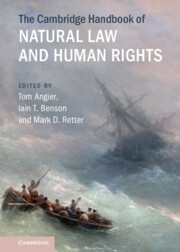Book contents
- The Cambridge Handbook of Natural Law and Human Rights
- The Cambridge Handbook of Natural Law and Human Rights
- Copyright page
- Contents
- Contributors
- Acknowledgements
- Introduction
- Part I Natural Law and the Origins of Human Rights
- 2 Natural Law and Human Rights
- 3 The Paradox of Shrinking Individuality
- 4 Synderesis, Conscientia, and Human Rights
- 5 The Case against the Marriage of Natural Law and Natural Rights
- 6 The Mythical Connection between Natural Law and the Universal Declaration of Human Rights
- 7 Natural Law and the Universal Declaration of Human Rights
- Part II Natural Law Foundations of Human Rights Obligations
- Part III Natural Law and Human Rights within Religious Traditions
- Part IV The Human Person, Political Community, and Rule of Law
- Part V Rival Interpretations and Interpretive Principles
- Part VI Challenges and Future Prospects
- Index
7 - Natural Law and the Universal Declaration of Human Rights
from Part I - Natural Law and the Origins of Human Rights
Published online by Cambridge University Press: 03 November 2022
- The Cambridge Handbook of Natural Law and Human Rights
- The Cambridge Handbook of Natural Law and Human Rights
- Copyright page
- Contents
- Contributors
- Acknowledgements
- Introduction
- Part I Natural Law and the Origins of Human Rights
- 2 Natural Law and Human Rights
- 3 The Paradox of Shrinking Individuality
- 4 Synderesis, Conscientia, and Human Rights
- 5 The Case against the Marriage of Natural Law and Natural Rights
- 6 The Mythical Connection between Natural Law and the Universal Declaration of Human Rights
- 7 Natural Law and the Universal Declaration of Human Rights
- Part II Natural Law Foundations of Human Rights Obligations
- Part III Natural Law and Human Rights within Religious Traditions
- Part IV The Human Person, Political Community, and Rule of Law
- Part V Rival Interpretations and Interpretive Principles
- Part VI Challenges and Future Prospects
- Index
Summary
The Universal Declaration of Human Rights was proclaimed as a ‘common standard of achievement for all peoples and all nations’ and rests on the claim that persons are ‘endowed with reason and conscience’. The drafters were thus aligned with the claims of the natural law tradition that there are timeless principles of morality – true for all people in all places – and that these principles serve as a guide for lawmakers and a standard to evaluate positive law. Catholic philosopher Jacques Maritain argued that the drafters did not need to agree on the philosophical or metaphysical foundations of morality in order to agree on formulations of practical principles in the language of universal rights. This key insight helped to overcome obstacles to the UDHR and to guide key drafters including Charles Malik. Maritain’s account of natural law in The Rights of Man and Natural Law highlights the notion of jus gentium: commonly agreed principles that are intermediate between the first principles of natural law and positive law. The UDHR can be understood as a successful attempt to formulate jus gentium principles in the aftermath of a war that had seen them disregarded and violated.
Keywords
- Type
- Chapter
- Information
- The Cambridge Handbook of Natural Law and Human Rights , pp. 100 - 116Publisher: Cambridge University PressPrint publication year: 2022

